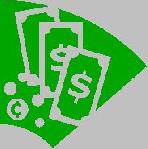
 |
|
| Financial Terms | |
| Trade credit |
|
Information about financial, finance, business, accounting, payroll, inventory, investment, money, inventory control, stock trading, financial advisor, tax advisor, credit.
Main Page: tax advisor, inventory control, financial, payroll, finance, inventory, accounting, financial advisor, |
Definition of Trade credit
Trade creditcredit granted by a firm to another firm for the purchase of goods or services.
Related Terms:Export-Import Bank (Ex-Im Bank)The U.S. federal government agency that extends trade credits to U.S. FCIAForeign credit Insurance Association. A private U.S. consortium of insurance companies that offers Full Credit PeriodThe period of trade credit given by a supplier to its customer. Balance of tradeNet flow of goods (exports minus imports) between countries. Basket tradesRelated: Program trades. Best-interests-of-creditors testThe requirement that a claim holder voting against a plan of reorganization Block tradeA large trading order, defined on the New York Stock Exchange as an order that consists of  Comparative credit analysisA method of analysis in which a firm is compared to others that have a desired Consumer creditcredit granted by a firm to consumers for the purchase of goods or services. Also called Counter tradeThe exchange of goods for other goods rather than for cash; barter. CreditMoney loaned. Credit analysisThe process of analyzing information on companies and bond issues in order to estimate the Credit enhancementPurchase of the financial guarantee of a large insurance company to raise funds. Credit periodThe length of time for which the customer is granted credit. Credit riskThe risk that an issuer of debt securities or a borrower may default on his obligations, or that the Credit scoringA statistical technique wherein several financial characteristics are combined to form a single  Credit spreadRelated:Quality spread Crediting rateThe interest rate offered on an investment type insurance policy. CreditorLender of money. Demand line of creditA bank line of credit that enables a customer to borrow on a daily or on-demand basis. EurocreditsIntermediate-term loans of Eurocurrencies made by banking syndicates to corporate and Evergreen creditRevolving credit without maturity. Federal credit agenciesAgencies of the federal government set up to supply credit to various classes of Five Cs of creditFive characteristics that are used to form a judgement about a customer's creditworthiness: Flat trades1) A bond in default trades flat; that is, the price quoted covers both principal and unpaid, Floor traderA member who generally trades only for his own account, for an account controlled by him or Foreign tax creditHome country credit against domestic income tax for foreign taxes paid on foreign  Forward tradeA transaction in which the settlement will occur on a specified date in the future at a price Full faith-and-credit obligationsThe security pledges for larger municipal bond issuers, such as states and Informationless tradestrades that are the result of either a reallocation of wealth or an implementation of an Information-motivated tradestrades in which an investor believes he or she possesses pertinent Investment tax creditProportion of new capital investment that can be used to reduce a company's tax bill Letter of credit (L/C)A form of guarantee of payment issued by a bank used to guarantee the payment of Line of credit An informal arrangement between a bank and a customer establishing a maximum loan Line of creditAn informal arrangement between a bank and a customer establishing a maximum loan Posttrade benchmarksPrices after the decision to trade. Pre-trade benchmarksPrices occurring before or at the decision to trade. Program tradesAlso called basket trades, orders requiring the execution of trades in a large number of Publicly traded assetsAssets that can be traded in a public market, such as the stock market. Registered traderA member of the exchange who executes frequent trades for his or her own account. Retail creditcredit granted by a firm to consumers for the purchase of goods or services. Reversing tradeEntering the opposite side of a currently held futures position to close out the position. Revolving credit agreementA legal commitment wherein a bank promises to lend a customer up to a Revolving line of creditA bank line of credit on which the customer pays a commitment fee and can take Spot tradeThe purchase and sale of a foreign currency, commodity, or other item for immediate delivery. Terms of tradeThe weighted average of a nation's export prices relative to its import prices. Thinly tradedInfrequently traded. TradeA verbal (or electronic) transaction involving one party buying a security from another party. Once a Trade acceptanceWritten demand that has been accepted by an industrial company to pay a given sum at a future date. Trade dateIn an interest rate swap, the date that the counterparties commit to the swap. Also, the date on Trade debtAccounts payable. Trade draftA draft addressed to a commercial enterprise. See:draft. Trade on top oftrade at a narrow or no spread in basis points relative to some other bond yield, usually Trade houseA firm which deals in actual commodities. TradersPersons who take positions in securities and their derivatives with the objective of making profits. Uptick tradeRelated:Tick-test rules CreditBuying or selling goods or services now with the intention of payment following at some time in CreditorsPurchases of goods or services from suppliers on credit to whom the debt is not yet paid. Or a CreditOne side of a journal entry, usually depicted as the right side. North American Free Trade Agreement (NAFTA)an agreement among Canada, Mexico, and the United States establishing the North American Free trade Zone, with a resulting reduction in trade barriers World Trade Organization (WTO)the arbiter of global trade that was created in 1995 under the General Agreement on Tariffs and trade; each signatory country has one credit analysisProcedure to determine the likelihood a customer will pay its bills. credit policyStandards set to determine the amount and nature of credit to extend to customers. line of creditAgreement by a bank that a company may borrow at any time up to an established limit. trade-off theoryDebt levels are chosen to balance interest tax shields against the costs of financial distress. Balance of Merchandise TradeThe difference between exports and imports of goods. Balance of TradeSee balance of merchandise trade. Credit CrunchA decline in the ability or willingness of banks to lend. Credit RationingRestriction of loans by lenders so that not all borrowers willing to pay the current interest rate are able to obtain loans. Free TradeThe absence of any government restrictions, such as tariffs or quotas, on imports or exports. Investment Tax CreditA reduction in taxes offered to firms to induce them to increase investment spending. Terms of TradeThe quantity of imports that can be obtained for a unit of exports, measured by the ratio of an export price index to an import price index. Trade DeficitDeficit on the balance of merchandise trade. Consumer Credit Protection ActA federal Act specifying the proportion of Trade LoadingA term used for channel stuffing in the domestic tobacco industry. Creditor Proof ProtectionThe creditor proof status of such things as life insurance, non-registered life insurance investments, life insurance RRSPs and life insurance RRIFs make these attractive products for high net worth individuals, professionals and business owners who may have creditor concerns. Under most circumstances the creditor proof rules of the different provincial insurance acts take priority over the federal bankruptcy rules. CreditA rating of a company's credit (ability to payback debt), usually by a third party credit agency. Credit LossA loan receivable that has proven uncollectible and is written off. Credit RiskFinancial and moral risk that an obligation will not be paid and a loss will result. Credit TermsConditions under which credit is extended by a lender to a borrower. Credit Unioncredit unions are community based financial co-operatives and most offer a full range of services. All are owned and controlled by members who are also shareholders. credit unions are regulated provincially and insured by a stabilization fund, deposit insurance or guarantee corporation. CreditorPerson or business that is owed money. Export Credit InsuranceThe granting of insurance to cover the commercial and political risks of selling in foreign markets. Formalized Line of CreditA contractual commitment to make loans to a particular borrower up to a specified maximum during a specified period, usually one year. Letters of CreditA letter of credit is a guarantee of payment by a bank (issuing institution)to a third party for a specific amount of money, if certain conditions are met. Line of CreditAn agreement negotiated between a borrower and a lender which establishes the maximum amount against which a borrower may draw. The agreement also sets out other conditions, such as how and when money borrowed against the line of credit is to be repaid. Operating Line of CreditA bank's commitment to make loans to a particular borrower up to a specified maximum for a specified period, usually one year. Revolving CreditLine of credit against which funds may be borrowed at any time, with regular scheduled repayments of a predetermined minimum amount. Supplier CreditPeriod of delay allowed by a firm's supplier to pay its invoices. Frequently, the terms are : 2% discount on invoice if paid in 10 days or net if paid in 30 days. creditOn your bank statement, 'credit' represents funds that you have deposited into your account. The opposite of a credit is a debit. credit bureauAn organization that provides financial institutions with credit information concerning existing or potential customers who are looking to obtain credit services. credit cardA revolving source of credit with a pre-established limit. You have to pay interest on a credit card if you have an outstanding balance. credit memoA record of the funds which have been credited to your account. line of creditA revolving source of credit with a pre-established limit. You access the funds only as you need them, and any amount that you pay back becomes accessible to you again. Unlike a personal loan, a line of credit permits you to write cheques and make bank machine withdrawals, and requires you to pay interest only on the funds that you actually use. personal line of credit (PLC)A revolving source of credit with a pre-established limit. You access the funds only as you need them, and any amount that you pay back becomes accessible to you again. Unlike a personal loan, a PLC permits you to write cheques and make bank machine withdrawals, and requires you to pay interest only on the funds that you actually use. secured loan or line of creditA lump sum of funds (loan), or a revolving source of credit with a pre-established limit (line of credit), for which the customer must provide collateral. Accidental Dismemberment: (Credit Insurance)Provides additional financial security should an insured person be dismembered or lose the use of a limb as the result of an accident. Amortization (Credit Insurance)Refers to the reduction of debt by regular payments of interest and principal in order to pay off a loan by maturity. Beneficiary (Credit Insurance)The person or party designated to receive proceeds entitled by a benefit. Payment of a benefit is triggered by an event. In the case of credit insurance, the beneficiary will always be the creditor. Related to : financial, finance, business, accounting, payroll, inventory, investment, money, inventory control, stock trading, financial advisor, tax advisor, credit. |